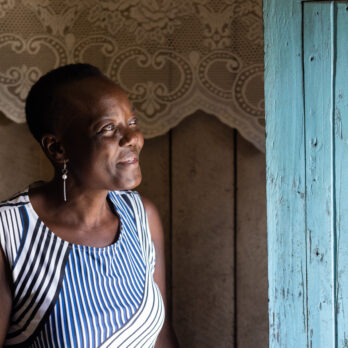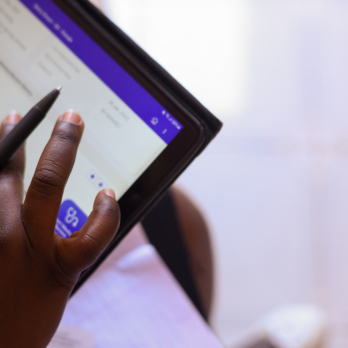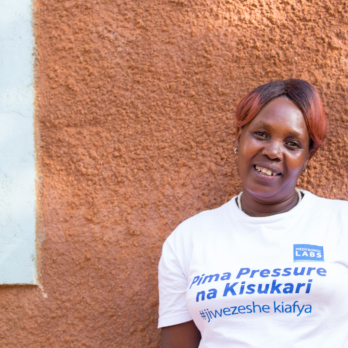Measurable patient outcomes, not shareholder profits, have always been the driving force behind our work at Medtronic LABS. And with over five years of history delivering on-the-ground health care to underserved communities worldwide, we are proud to say that our philosophy works.
Every year we continue to positively impact more lives, transform delivery models for more health conditions, and build and sustain cross-sector partnerships with companies and governments that span the globe.
Today, we are thrilled to introduce you to a member of the Medtronic LABS team, Eric Angula, whose tireless efforts and commitment to a more equitable global health system contribute to our patients’ and our successes every day.
As Head of Strategic Partnerships & Government Affairs, Mr. Angual has been with Medtronic LABS since 2018. He recently shared with us his motivations for joining the Medtronic LABS team, some of his upcoming initiatives, and the importance of meaningfully engaging governments in providing lifesaving healthcare.
Read the full Q&A below.
Tell us a bit about your professional history. What inspired you to join Medtronic LABS?
My initial inspiration to work in this field arose in 2015. At that time, I was working for Medtronic – Medtronic LABS’ parent company – as a Business Unit and Sales Manager in West Africa. In this role, I had the opportunity to focus on improving patient pathways to identify non-communicable diseases (NCDs) and other illnesses earlier and more effectively intervene. I saw the direct impact that early detection and access to good care had on patient outcomes. Since then, my passion has been to provide quick and accessible health care.
This brings us to 2018 when I transitioned from Medtronic to Medtronic LABS. Since then, I have been focusing on business development through partnerships, specifically on ensuring that patients are served.
My role involves collaborating with multiple partners and government entities to ensure alignment and achieve common goals.
What that entails is finding new partners, communicating the value of our work to them, and working to expand NCD care management across Africa and beyond.
In recent years, we have realized the importance of being more intentional in our approach to partnering with governments. This change in strategy has played a huge role in our recent collaboration success stories.
How did you discover your passion for advocating for and expanding access to timely, affordable health care?
My passion for global health began when I was working as a sales manager at Medtronic. My portfolio included products for the Intensive Care Unit and other surgical procedures.
I worked closely with a few specific types of cancer and noticed that patients were often presented to us too late for treatment. Telling patients that we couldn’t help them was extremely difficult for me.
While working at Medtronic, I initiated programs to screen cancer patients in Kenya and advocated for early screening and surgeries for colorectal cancer.
At that time, I did not know that this field was called global health, but these experiences led to me developing an interest in understanding the economic, political, and societal aspects of our global healthcare system.
As I alluded to before, these experiences helped us [at Medtronic LABS] realize the importance of being more intentional in our approach when working with governments.
What does a more intentional approach to government partnerships look like?
Well, we are at a critical point in the evolution of government processes where we have reflected on our past experiences and learnings. To support our work, we have realized that sustainability is key.
Our approach to partnerships shifts when we consider long-term viability. The government must take full ownership, so we are focusing more on this aspect. By working closely with the government, we can pivot and leverage significant resources by positioning the government as the center.
Understanding the unique needs of communities is essential, and customizing our approach accordingly is necessary. Medtronic LABS was founded on a human-centered approach, aiming to build solutions that speak to distinct communities.
Through constant communication, we have learned that no two governments are the same and each country has its own priorities and goals. But the patient is always at the center of our work.
We need to tailor our solutions to the needs of every country, community, and individual we reach. For example, the Rwandan government is very persistent in providing useful solutions to its people, while in other countries, that may not be the case.
What are some of the current initiatives that you’re most excited about? Are there any new programs coming up?
We are on the brink of signing a groundbreaking program with the World Diabetes Foundation in Kenya, which will reach 85-90% of the country.
This program will demonstrate that our solution is valuable and scalable. Additionally, we are exploring different models for introducing a social system in other countries.
We are considering partnering with national insurance funds to promote primary care for diabetes, hypertension, and other chronic diseases. We’re having these conversations and working to revolutionize insurance for primary care across the globe.
Many NGOs work in low to middle-income countries to improve patients’ health outcomes. What sets Medtronic LABS apart from the others?
Our focus on impact and the patient’s well-being throughout the process sets us apart. Most programs are output-based, focusing on achieving certain funding or metrics, such as training a certain number of people or screening a certain number of patients.
At Medtronic LABS, we prioritize impact and look at how our work improves the patient’s health. This approach has been well-received and has allowed us to scale our programs effectively. We also have data to show the positive impact on patients, which is a key differentiator.
Also, we are dedicated to understanding the ecosystem surrounding the patient and their journey to accessing healthcare. We map out the patient’s journey, identifying barriers or challenges they may face in accessing interventions and care.
We have seen cases where patients cannot reach facilities due to financial constraints, such as spending more money on transportation than the medication they need. Our goal is to create a better journey for the patient. We do not just run programs because funding and KPIs are in place—we ensure that the patient benefits from the program by tracking their progress from the start of the intervention to when they become more self-sufficient in managing their condition.
Our team includes clinical researchers and data scientists who leverage empirical results to inform our findings and communicate them to stakeholders and governments. This systematic approach is how we bring change to the communities we work with.
Lastly, what are some of the most rewarding parts of your work at Medtronic LABS? How about the challenges?
My passion is driven by the patients living in rural villages who may not even be aware that they have diabetes or hypertension. Their well-being motivates me to get out of bed each day and work towards providing better support for them.
I believe that partnerships and building an ecosystem that addresses these issues are crucial. Funding is always a challenge, but as a community, we need to unite and work together instead of each partner going in their own direction.
Aligning partners and the government is the next step for us as an organization to accelerate our progress and make an impact.
A clear vision, built on measurable patient outcomes
We hope you enjoyed this Q&A session with Medtronic LABS Head of Strategic Partnerships & Government Affairs, Eric Angula. Our conversation with Mr. Angula is the third in our conversation series with Medtronic LABS leaders. If you missed the first two, read them now on our blog, along with other exciting insights and stories. Stay tuned for more team profile features in the coming weeks and months.
To get in touch with us, please visit our contact page. Together, we can transform global healthcare systems and deliver essential care to those in need.


